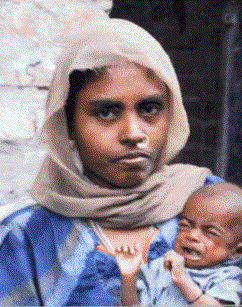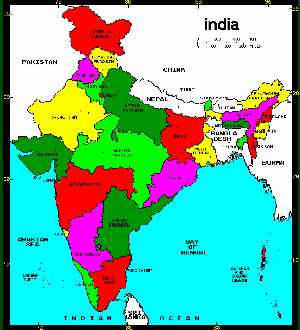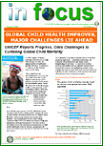|
PROMOTING CHILD SURVIVAL AND FAMILY HEALTH IN INDIA

An Indian villager seeks to improve the chances of her child's survival
Despite extensive international and national efforts over the past several decades, the majority of under-five deaths in India is caused by communicable, maternal and perinatal conditions, and nutritional deficiencies. These largely preventable conditions constitute some 50 percent of the disease burden in India today, and India still leads the world in malnutrition, with an estimated 53 percent of children under five years being malnourished in 1996 and 217,000 children under five expected to die of diarrhea even in the year 2000. Among deaths associated with malnutrition, however, more than three-fourths are linked not to severe, but to moderate or mild forms. While India continues to suffer from huge numbers of child deaths, major economic and social changes have brought a new brand of health problems - that of noncommunicable lifestyle diseases among the middle class as well as the poor. Although mortality from communicable, maternal and perinatal conditions, and nutritional deficiencies is expected to fall from almost 5 million to below 3 million a year in India by the year 2020, according to the 1996 Global Burden of Disease series issued jointly by the World Health Organization, the World Bank and the Harvard School of Public Health, deaths from noncommunicable disease and injuries in India are projected to almost double, from about 4 million to about 8 million a year. Scores of child survival and family health assistance programs in India are promoting breastfeeding, oral rehydration salts, iron and other micronutrient supplementation, and immunizations to alleviate vitamin deficiencies, malnutrition, low birth weight, diarrhea, and communicable diseases, and many such programs report success in combating the immediate challenge. However, neither their wide scale applicability nor their long-term impact has been fully evaluated or demonstrated. Consequently, both public health officials and donor agencies continue to seek approaches that have the potential for deeper impact and broader outreach throughout India and thus for integration into local and national policies. 
Locus of CECHE’s community intervention program
The overall evidence from child survival and family health programs in India points to the need for multifaceted, practical strategies with wide-scale applicability and the potential for making a major contribution to improving and reducing morbidity and mortality throughout India. Clearly no single approach will suffice to address India's vicious child mortality cycle due to poverty, poor reproductive health and malnutrition. With a demonstrated history in community development, innovative public education, professional training, and policy reform, The Center for Communications, Health and the Environment (CECHE) has initiated a multidimensional mass media-based community intervention program, in collaboration with the Indian NGO counterparts, aimed at promoting the health of mothers and their children in urban-rural communities in India. The Promoting Child Survival and Family Health project aims to bridge this gap through a model demonstration project that builds on traditional approaches and their successes to date, incorporates the lessons learned and uses local and national print and electronic media to reach the masses in India. The emerging health threat to India's rural-urban population requires urgent attention together with the challenge of ensuring reproductive health and child survival that continue to plague India. India still leads the world in malnutrition, with an estimated 53% of children under the age of five years being malnourished in 1996. Mass media coupled with traditional health education practices has been effectively used to promote health behavior worldwide. The opportunity today to reach the masses in India through television and other mass media is unparalleled in history. CECHE has successfully used mass media to educate, motivate and advocate health in its programs in Central and Eastern Europe. CECHE is using this experience to improve the nutritional status and prevent malnutrition-related illnesses and deaths of infants, children and pregnant and lactating women by promoting the following: the provision of adequate food during pregnancy and lactation; protection and support of breastfeeding and complementary feeding practices; frequent feeding and nutritional surveillance; supplementation of vitamin A, iodine and iron to prevent deficiencies for both women and their children; diarrhea prevention and treatment through early use of available food-based fluids and use of ORS, continued breastfeeding, small frequent feeds, catch up feeding following diarrheal episodes and appropriate treatment in severe cases; and pregnancy care and postpartum care of the mother and newborn. An additional effort will be made to educate families about the emerging threat and prevention of lifestyle diseases caused by smoking, alcohol, lack of exercise and excessive intake of food. Our program is educating health providers, caretakers and community members by improving the technical training and interpersonal communication skills of traditional health providers, health workers and link workers, and by teaching mothers to properly care for their children and prevent malnutrition and related childhood illness. CECHE partnered with the American Institute of Cancer Research (AICR), and the S.I. Newhouse School of Public Communications at Syracuse University to undertake a multidimensional mass media-based community intervention program, aimed at promoting maternal, child, and family health and nutrition for the urban-rural family in India. The project is expected to lead to the following:
CECHE is seeking to increase indigenous capacity of health and media professionals and NGOs and to set the pace in catalyzing progressive local and national health policies and on lifestyle practices that will positively affect family and child health in throughout India. Simultaneously, we are seeking funds for the ongoing effort. CECHE has completed a media training program as a first priority and produced a series of TV programs and PSA’s geared to reproductive health promotion in India. For purchasing PSA’s, click here |
|
|||||||||||
Questions? Comments? Concerns? E-mail CECHE at CECHE@comcast.net Go back to the CECHE home page Go back to the CECHE home page
|

